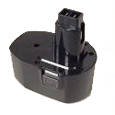Cordless Power Tool Battery
Cordless Battery Pack for Drills,
Saws & Drivers
 The
name of the game is to have great mobility. Get rid of the
ball and anchor that ties us to the power bar. That is why
we are considering buying a cordless power tool. Battery power
though, has to meet our production needs. It has to do the
job! It has to be powerful, lightweight and long lasting....
and work in cold weather!
The
name of the game is to have great mobility. Get rid of the
ball and anchor that ties us to the power bar. That is why
we are considering buying a cordless power tool. Battery power
though, has to meet our production needs. It has to do the
job! It has to be powerful, lightweight and long lasting....
and work in cold weather!
In the last 25 years, tool manufacturers like Makita, DeWalt and Milwaukee have invested huge research dollars to advance the technology. The main focus has been to produce a lighter cordless power tool. Battery weight has been the greatest challenge, and the greatest opportunity for improvement.
By studying the understanding the advantages and disadvantages of each kind of cordless tool battery, we can more effectively purchase tools that best fit our needs.
Nickel cadmium (NiCad): The "Ni-cd" is the mother of all batteries typically used for a cordless power tool. Battery production is relatively less expensive then other alternatives and these batteries have proven to be fairly durable and a cold weather friend.
Ni-cd batteries are more likely to take more charges then their Ni-Mh cousin but have a history of "memory affect problems." Some manufacturers dispute this, as second generation ni-cad batteries come onto the market, especially in the higher end professional grade cordless tools.
Cadmium is consider to be a hazardous waste and in this more environmentally conscious society ni-cad batteries do present some marketing challenges. They are also larger and heavier then the next generation of Ni-Mh batteries
As well, many feel that a ni-cd cordless battery pack has reached its peak performance within the constraints of acceptable weight. It has no more juice to give. As we demand more powerful cordless tools, so must follow the battery technology.
Nickel-metal hydride (Ni-Mh): these batteries were originally introduced as a more environmentally friendly and powerful battery option. But their design dictated greater internal resistance and its associated heat generation. It is this heat production that leads to it downfall.
In fact chargers for the Ni-mh batteries include fans onboard so the batteries don't overheat.
Heat causes the nickel metal hydride batteries to survive less re-charges and thus offer a shorter life cycle. This leads to a lot of consumer frustration with the ongoing need to purchase a new cordless battery pack. The higher amperage, lower weight and smaller size of the typical Ni-Mh battery is offset by its shorter life cycle and thus higher cost.
Metal hydride batteries were also not well known for cold weather performance, thus for any in the construction trade where outdoor usage was a factor, they tended to stay with the heavier but more reliable ni-cd batteries.
Li-ion: This is the new kid on the block that is promising to blow all other cordless battery packs out of the water.
- lowest weight of the 3 for any given voltage
- maintains runtime at the lowest temperatures
So what's the down side? Li-ion batteries require an electronic circuit to control the power movement both to the motor and from the charger, assuring that each cell receives and expels the same amount of power. This prevents damage to your Li-ion cordless battery pack. It also suggests longer re-charge times to allow for rebalancing cell to cell differentials and more sophisticated battery chargers. This all adds to the cost and complexity of the design.
Time will tell if this technology will be the winning one.
Some Generalities: #1 = best #3 = worst
|
Ni-Cd
|
Ni-Mh
|
Li-ion
|
|
| Lightest |
#3
|
#2
|
#1
|
| Cold Weather |
#2
|
#3
|
#1
|
| Best Price |
#1
|
#2
|
#3
|
| Run Time |
#3
|
#2
|
#1
|
| Shortest Recharge time |
#1
|
#2
|
#3
|
| Life Cycle |
#1
|
#2
|
#1
|
Key Factors for Cordless Power Tool Battery:
Run time is the amount of work a tool can do, from one charge. As the battery reaches the end of its service life, you often notice a decline in run time
Life cycle is the number of times you can recharge the battery.
Amp-hour rating: The higher the rating the longer your tool will last, so this is the key to comparing two identical, say 14.4 volt cordless batteries to figure out which cordless power tool battery will last the longest.
